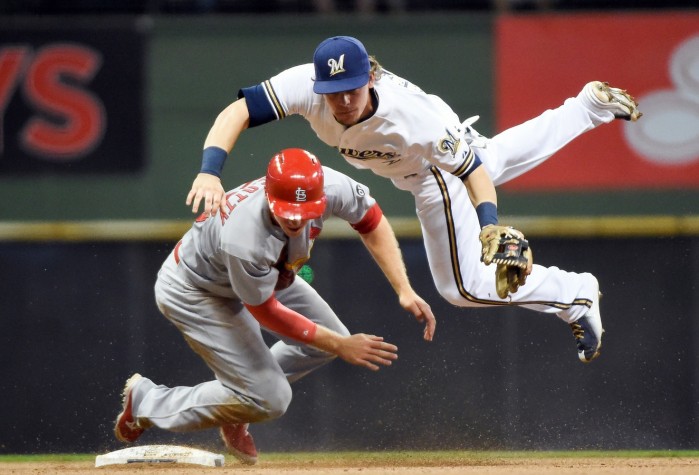Scooter Gennett has been overshadowed in recent weeks, with the emergence of Orlando Arcia and the Gomez/Parra trades infusing additional exciting, young talent into the farm system. Indeed, as the 25-year-old second baseman has struggled, he and shortstop Jean Segura have lost much of their luster as the team’s key building blocks. Guys like Arcia, Brett Phillips, Domingo Santana, Josh Hader, and others have usurped their place.
Much of this is justified, as both of the fledgling middle infielders have struggled to various extents this season. Segura, though, has a track record of success (even if it is quite short), while Gennett has never really produced in a full big-league season.
He has just cracked 1,000 career plate appearances, and his career TAv is .266 — which is slightly above the league average of .260. However, simply stating his true average overstates his impact. His offensive production has declined each year he has been in the majors, and that dropoff is not just a matter of batted ball luck or injuries. His walk rate remains consistently about half the league’s average, and it is even lower this year (3.0 percent) than it had been in his first two seasons (over 4.0 percent each season).
That latter point becomes troublesome, as the young second baseman does not combine this dismal walk rate with elite power. His ISO has hovered around the league-average mark for each of his three years in the big leagues. While this is generally perfectly acceptable for a middle infielder — after all, league-average includes corner players who are much larger — an average amount of power cannot be a carrying tool. Gennett does not get on base frequently enough to have a high OBP, and his low ISO means that those failings are exacerbated by a lack of other skills. Thus, while his batting average remains an acceptable .287 (for his career), that number is actually mostly empty.
Additionally, Gennett provides no value with his glove. While defensive metrics are far from perfect, each of the three major ones (FRAA, UZR, and DRS) agree that he has been a negative defender over the course of his career. And when a player can’t combine a mediocre bat with any sort of value with his glove, he mitigates a lot of the excess value that comes from the positional adjustment.
Obviously, though, we want to determine how likely Gennett’s subpar performance is to carry over to the next few years, and the forecast is not good. His contact skills have not eroded — a contact percentage of over 91 percent on pitches in the strike zone in each of his first three years — but he has done increasingly less with those swings. As was mentioned above, his ISO has declined each season.
He also has shown no ability to hit left-handers. A lefty-swinging second baseman has a bit of extra value because middle infielders have to be right-handed throwers, so lineups can become skewed towards righties very easily. Gennett allows the Brewers to know that they can get a left-handed bat into the lineup from a non-traditional spot. But some of that value is lost when the lefty cannot even passably hit same-sided pitching. This trend has existed for his entire time in the big leagues; he has never gotten more than 50 plate appearances against left-handed pitching, and he — somewhat unbelievably — has never posted an OPS over .350 against them. He was never that disastrous against lefties in the high minors (.607 OPS versus lefties in Double-AA in 2012), as he at least hovered around .600. In the majors, though, he has a career .297 OPS.
Essentially, this makes him nothing more than the strong side of a platoon. And while that can make him valuable in a vacuum, his skill set unfortunately does not exist in said vacuum. He is a second baseman with limited defensive utility. He is not like Darwin Barney, who spent his whole career as an elite defensive second baseman before being transitioned to backup shortstop. Thus, on the days Gennett does not play, he cannot be used as a defensive replacement at any position except second, and he’s not good enough at even his primary position to justify that usage.
All of this would clearly be mitigated if he were a good enough hitter to justify being an offensive half of a platoon. As I established above, though, he is not, which should mean that his future with the Brewers is uncertain. He is a below-average defensive second baseman who is barely (if at all) above average with his bat. Even though he is cost-controlled, such a player has little value for this team.
The presence of Orlando Arcia makes Gennett’s future even rockier. Arcia will presumably be the starting shortstop sooner rather than later in 2016, and Jean Segura — while disappointing himself — has been significantly better than Gennett and would presumably be a very good defender at the very least. Thus, if all of three of these players remain in the organization on Opening Day 2016, Gennett’s days as a member of the Brewers should be numbered.

4 comments on “Scooter Gennett’s Uncertain Future”